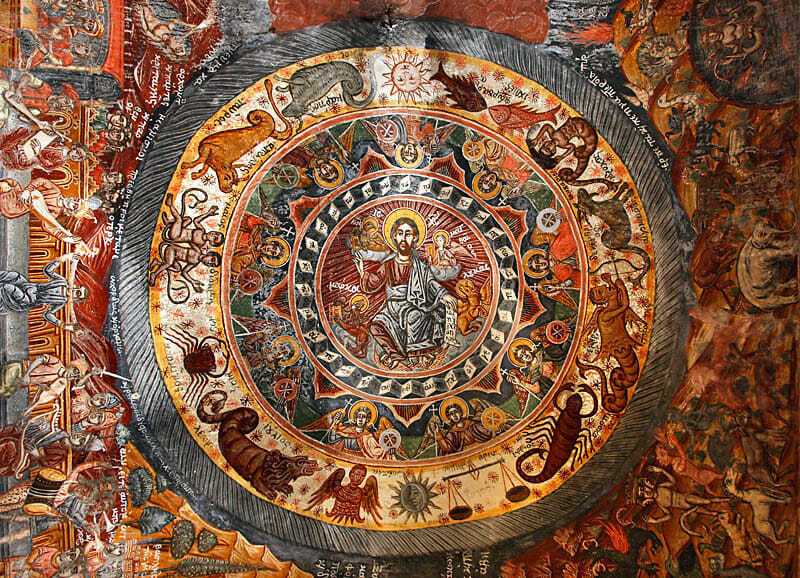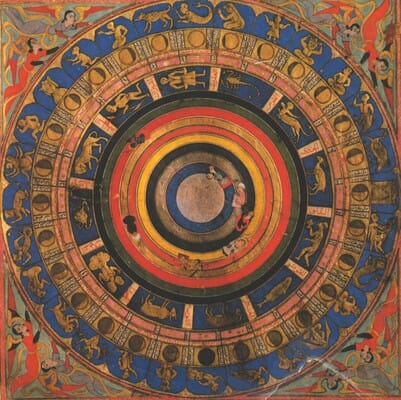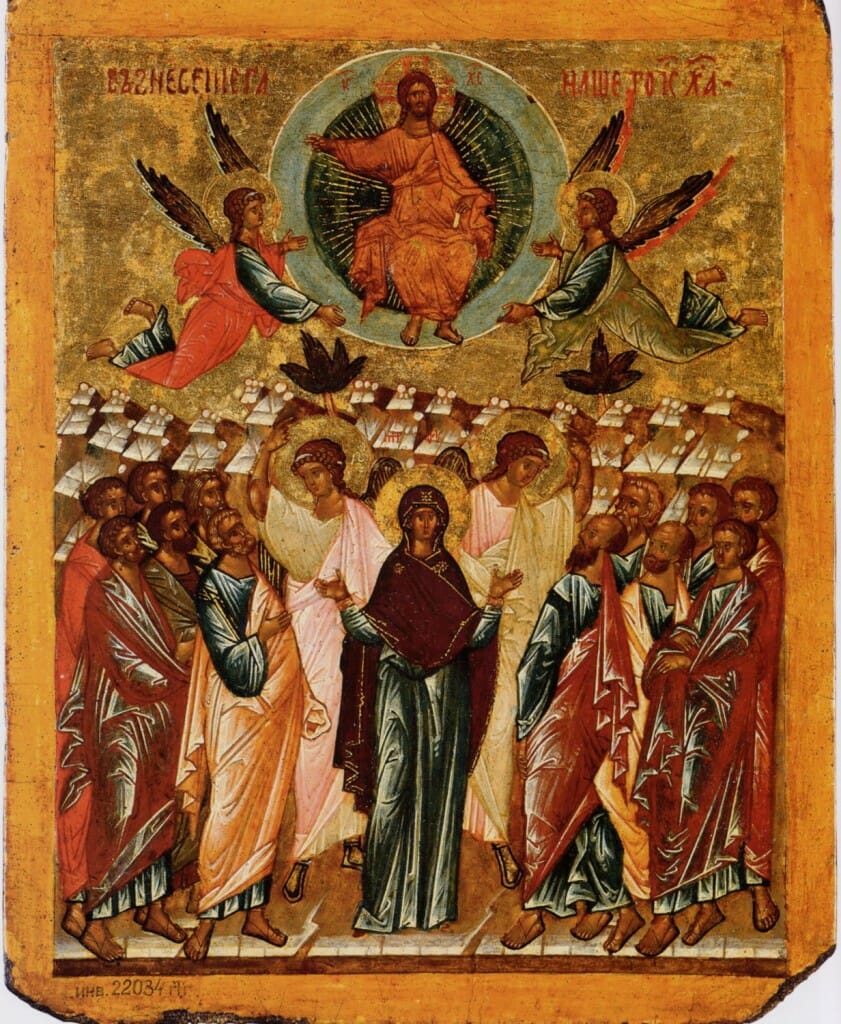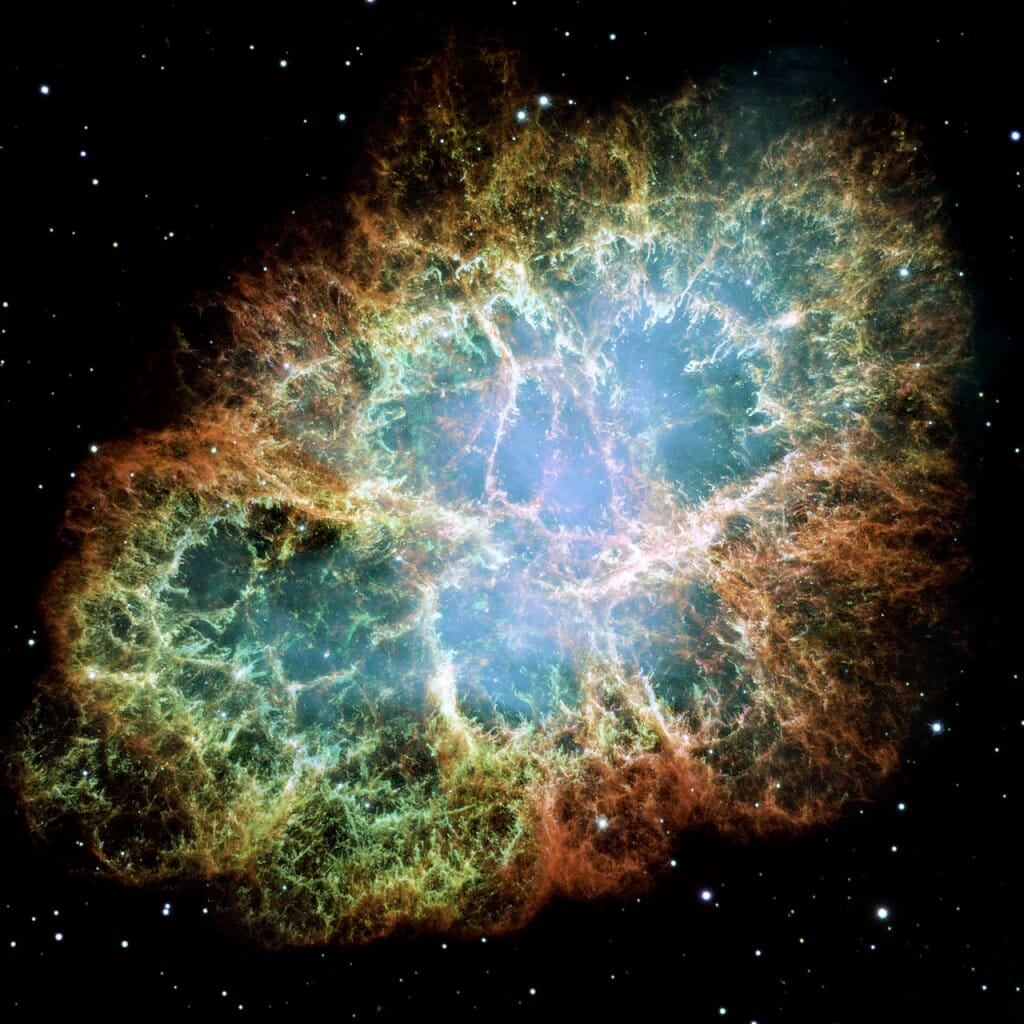Similar Posts
Science, modern science that is, has engulfed nearly our entire gaze. It has become the transparent self-effacing tableau on which we experience the world, the glasses we wear to judge the truth, the standard we hold against our experience. Self-obvious to most, the material, quantitative vision of the Universe that has developed since the so-called Enlightenment has become both the largest bludgeon wielded against religion whilst simultaneously being raised as the final stand of “truth”, the last fragile barricade erected by some religious proponents against an unstoppable onslaught.
The scientific world machine is so pervasive, so iron cast that it retrofits itself to the entire history of human experience. We therefore encounter in most modern historical narratives the tales of “superstition”, of “if only they knew” culminating to that pernicious statement we have all heard: “people used to think this, but now we KNOW…”. Of course this is only natural. History, as they say, is written by the victor. But I would prefer to say that history is not so much written by the victor as it is FRAMED by the victor. For that which changed in the 17th century during that tumultuous age in Western Europe, that which had been cracking for 400 years already but finally broke into pieces was the frame of thinking of the Middle Ages.
I would like to show you this frame as much as I can but I must be honest to the near-impossibility of doing this. Somewhat akin to freeing oneself from the platonic cave, stepping back to see our own world view for what it is requires us to slide into a place that is often far too risky, far too disorienting for most people to tread. It can be like falling into a void, losing an entire universe, but for those who dare the jump it can also cause true “metanoïa”, true “transcendence of mind”.
Despite the pervasive nature of modern science, what is fascinating to behold is how the old world view, especially the traditional, ancient and universal cosmology is still there, lingering so close to us that is has found itself trapped between our actual human experience and our scientific theories about the world. The sun, the moon and planets still rise in the east, the earth does not move unless there is an earthquake, and the sky is still up there stretched like a dome over our heads. Of course we are told that this experience is but an illusion. But the clash is real, especially for those of us who are still attached to Tradition. We need to acknowledge the kind of schizophrenia we experience when we say things like “Our Father who is in Heaven”, when we look at icons of Christ underground in Hades, when the priest lifts up the Host during the Liturgy. What is going on there? When we say Christ ascended to Heaven, where did he go? Into orbit? To the Moon? This clash has lured liberal protestant theologians like Rudolf Bultmann into “de-mythologizing” Christianity, that is removing from religion all those pesky things which do not fit our modern, scientific, rational world view.
The problem with the de-mythological remodelling is that it fails to perceive modernity’s own “myth” squeezed through iron blinders, its own grand narrative of a Scientific Material world where human happiness is arrived at by material and technical progress. It fails to take into account the now oh-so-visible side-effect of modern cosmological perspective on the human psyche, how it plays its part in the alienated state of modern man. De-mythologizing ignores how modern science contributes to the extreme human abuse of Creation through weapons of mass destruction, the industrial carnage of total war and plain old greedy industrial materialism leading to ecological disaster. The scientific method is by its very form a revolt against qualitative evaluation, it is an attack upon any teleology in phenomena, any meaning in things or how they change. So how then, can de-mythologizing serve those whose religion is hung on the fulcrum that all meaning within Creation culminates into the incarnate Logos?
I would like to propose something that might seem provocative at first, but will hopefully help people see the world with different eyes. There is a growing image on the recent horizon of human experience, it is an image of a family or a group of friends all next to each other at a table or in some other intimate setting, yet all interacting with tablets, ipods and smartphones as if the people around them didn’t exist. I would like to propose that this image, this reality is the final result of Galileo’s cosmological model. Some of you might think I am exaggerating, so I will need to explain.

Family time in the 21st century.
The Copernican/Galilean worldview, that is the heliocentric worldview and its further development into our modern cosmology of galaxies and nebulas and black holes has two important aspects. It is an artificial vision and it is an alienating vision. It is artificial in the strictest sense of “art” or “techne”. It is a technical vision because we cannot experience this vision without technology, without telescopes and other apparatuses. Because technology is a supplementary thing, a garment of skin, something which we add to our natures in order to physically bolster them toward the material world, it therefore also leads further into the material world itself. I have explained this paradox elsewhere, but it might be useful to go over the basic notion. A human technology, any technology exists in order to supplement human experience facing the dangers and challenges of physical existence. Clothing protects us from the climate, writing records things so we need not remember them all, weapons make us stronger than our enemies. But each technology leads us further into material existence because it gives us the sense of material strength. If I can build a house or create warm clothing I can live in places where without them I would surely die. If I now have matches to make fire I no longer need to learn to make fire without them. Since I have my mother’s phone number on my smartphone, there is no need to remember it. Each strength therefore is also at the same time a weakness because I inevitably become dependant on this artificial strength. Of course, there is nothing inherently wrong with this. In fact, there had always been technology as material supplement to existence, clothing, houses, tools developed by humanity to hold death at bay.
Truly though, it is only in the 17th century that humans engaged their eye into this process of supplement. It is only in the 17th century that men framed their vision with metal and glass, projecting their mind out into an artificially augmented space. Men always had artificial spaces, painting, sculpture, maps, but the telescope and microscope are self-effacing artifices, they attempt to replace the eye, to convince us that they are not artificial but are more real than the eye. It is not only the physical gesture of looking at the world through a machine that demonstrates the radical change, though this is symbolic enough, but it is the very fact that people would do that and come to the conclusion that what they saw through these machines was truer than how they experienced the world without them. Yet the great revolution is not simply a technical rectification as it is presented by some today, it is not only that technically speaking we used to believe the earth to be a flat disk at the centre of the cosmos, and now we know the earth to be a big ball of water and dirt swirling around a giant nuclear reactor at the centre of our planetary system. The change happens in the very core of what Truth is, it is a change in the priority of knowledge, a change in what is important to us as human beings. That is the change. In a traditional world, all of reality is understood and expressed in an integrated manner. We describe phenomena in the manner we experience it because what is important is not so much the making of big mechanically precise machines that will increase our physical power, but rather the forming of human beings that have wisdom and virtue. The resistance to the heliocentric model was a desire to “save the phenomena”, the desire to express the world as we experience it because this expression must remain connected to how human beings live their lives and interact with God and their fellow men. So by projecting ourselves out through our machines into an physically augmented world, we “fall” into that materiality, we inevitably live in a more material and materialist world. And this is modern history itself.
What proceeds from this is my second point, which is that modern cosmology is not only artificial, but it is alienating, it moves Man away from himself. Once Man accepted that what he saw through his telescopes and microscopes is more real than his natural experience, he made inevitable the artificial world, he made inevitable as its end the plastic, synthetic, genetically modified, photoshopped, pornographic, social-networked reality we live in. When at the very core of vision, the shape of your cosmos leads you to believe that technology provides a perception which is more true, more real than your experience, more real than walking out of your house and looking at the sky, then the telescope and the microscope will soon be side by side with the camera, the screen and the accelerated time and space of the car window. The metal and glass frame will swallow us and human beings will lose themselves for their incapacity to fully inhabit the world.

More than real. The parenting screen.
Most of us can name the planets in order of the Sun: Mercury, Venus, Earth, etc.. but how many of us can walk out at night and identify the planets in the sky as they travel the zodiac? How many of us can identify constellations other than the big dipper, little dipper and one or two more. I recently went to the planetarium with my children. They had redone the show to great acclaim, they said it helped children “experience” astronomy. As we sat there looking at a projection on the ceiling, we were zipped through the solar system, flew through the sun, through galaxies and nebulas a black holes. It was mesmerizing. It is comforting to know that there is at least a building close by where I can pay money in order to actually live in the cosmos of modern science for a few minutes. Too bad that most of the time I only half live in that world. A large part of me still trudges along on an unmoving Earth, with the sun, moon an starts travelling across the dome of Heaven. I am told the true image is not that of the Earth down here and sky up there that I experience every day, rather it is this picture of a ball floating in the void, a vision I will never have myself, unless I look at a picture or a screen, unless I am fortunate enough to be taken up in a big metal and glass machine that will shield me from an environment in which I would instantly die without its protection. Is this Truth? Is this Wisdom? Is this Virtue?
Now if from this you have gained the impression that I am denying the technical accuracy of modern Cosmology, it means I have not been able to pull you away from your frame enough to see it. Modern cosmology is indeed useful for sending up satellites and flying space ships, for sending a few people to colonize Mars. And even during the Middle Ages scholars believed the Earth to be a sphere. Multiple cosmologies should be able to coexist and play different functions, some more philosophical and human and others more technical and mathematical. But in our lives most of the time, the Earth is flat. Most of the time, the Heaven is up and the Earth is down, most of the time means in those instances when I am interacting with my family, my society and my enemies. And most of all, if we wish to understand religion and its symbolism, if we wish to understand the Bible or icons or church architecture we must anchor ourselves to the world of human experience, for that is where we can love our neighbor. We must force ourselves to believe that the sun rises every morning, or that the moon waxes and wanes and honestly it should not be so difficult, because despite Galileo and Newton and Einstein I’m pretty sure I will find some Truth in tomorrow’s rosy fingered dawn.
————————-
The second part of this article: Where is Heaven?






[…] Most of the Time, The Earth is Flat – Orthodox Arts Journal […]
Thank you Jonathan, excellent article!
It’s unfortunate that most people don’t get much of a chance to hear the daily Matins and Vespers services. There they would find the traditional “framing” you speak about more often in the symbolism of the hymnography. Great fresco of the zodiac. It clearly depicts the two heavens, noetic (angels) and corporeal (stars). I”m sure some suffering from the “de-mythologizing” symptoms would dismiss it as a “pagan” influence in iconography. But, “The heavens declare the glory of God.” Enumerating the creatures of the zodiac, as this fresco does, was something St. John of Damascus (Book 2, Chap. 7) was not squeamish about, as we see from his text, “On the Orthodox Faith.” Although, of course, without asserting that the stars determine our actions. Looking forward to the next post.
What a lot of nonsense! So, recognizing that the Earth orbits the Sun is what led nuclear warfare and everything else you don’t like about the 21st century?
CHRISTIANITY IS NOT A FAIRY TALE IN WHICH WE GET TO MAKE THE RULES. We don’t get to make the rules of physical reality, either. “Know ye that the LORD he is God: it is he that hath made us, and not we ourselves; we are his people, and the sheep of his pasture.” If you don’t like the way God created the Heavens and the Earth, your problem is with *HIM*, not with modern science.
The world was not flat to the Church Fathers. It had been known for centuries before the Incarnation that the Earth is round. Eratosthenes of Cyrene had measured the circumference of the Earth to within about 10% of its true value, which meant that the Greeks also knew the size and distance of the Moon. St. Peter (a fisherman) may not have known these things, but it’s a fair bet that St. Paul (who was clearly educated), St. Luke (a doctor), and maybe even St. Matthew (a tax collector) did.
Copernicus, Kepler, and Galileo may have followed heliocentrism, but by now it is centuries out of date. If you actually spoke to a physicist or an astronomer, you would find that there IS no universally special frame of reference from the point of view of physics. Instead, there is usually one frame of reference that is most sensible for any given problem. For example, if a stewardess tosses a package of pretzels to a seated passenger while their plane is in straight, level flight at a constant speed, a frame of reference in which the cabin of the plane is at rest makes most sense; it would only make things unnecessarily difficult to take into account the ground speed of the plane. If you are playing darts in a pub, you do not need to make allowances for the Earth’s rotation or orbit around the Sun. If you are sending a probe to Mars, you probably want to use a heliocentric frame of reference, but you don’t need to take into account the Sun’s orbit around the center of the galaxy. God chose to make the world with physical laws that are have (apparently) translational symmetry in space and time, among other symmetries, which is why these frames of reference are all valid. If you are unable to find beauty in these symmetries, don’t blame science.
“Earth shatters every attempt to penetrate it. It turns every merely calculational intrusion into an act of destruction. Though such destruction may be accompanied by the appearance of mastery and progress in the form of the technological-scientific objectification of nature, this mastery remains, nonetheless an impotence of the will. The earth is openly illuminated as itself only where it is apprehended and preserved as the essentially undisclosable, as that which withdraws from every disclosure, in other words keeps itself constantly closed up” Martin Heidegger, The Origin Of The Work of Art.
All I can say is that I apologize you have no idea what I am talking about. Hopefully it will become clearer in my next post.
Howard, you have it completely backward. It is our contemporary age that is a fantasy in which we think we get to make the rules. Think of this – in the middle ages, the finest and most expensive buildings were churches. Now the finest and most expensive buildings are hospitals. Why is this?
In the past, people understood that they had no power to change their fate. They were subject to their king, to the chaos of earthly life, and to inevitable death. Only this power did they have – to repent, and hope for God’s mercy.
Now, people are consumed with trying to change the rules. We try to spread democracy where all evidence shows that it can’t exist. We imagine it allows people to escape tyranny, when it clearly doesn’t. We try to re-engineer the fabric of social life with computerized interaction, imagining it gives us greater contact with friends, when it does the opposite. And most of all, we spend limitless resources to prolong our lives forever with medical intervention, yet we all still die.
None of this is a critique of science, per se, nor a suggestion that medieval ignorance was better. The point is that the medieval paradigm, as a world view, as a set of priorities, was more realistic than ours is now. I really don’t blame scientific discoveries for this change – not in any way. The worst epoch of intellectual arrogance was probably the late 18th century, when scientific knowledge had only slightly surpassed that of the middle ages. No, the paradigm shift that causes us to see ourselves as gods is something we can only blame on ourselves. We merely use scientific knowledge as a tool to try to realize our fantasies.
Good job, Jonathan.
I think your excitable detractor is quite upset. That is unfortunate.
When we listen to people’s actual point, rather than caricaturing them, we might actually behold something of great beauty, something that is large enough to find ALL phenomena [manifestations] beautiful, and not just some of them.
I’d like to start by acknowledging that I’m not going to deal much with your critique of scientism. It doesn’t apply to me nor to most anyone with whom I’ve even been in close relation. As you made no attempt to demonstrate that this perspective is in fact widely influential in how the modern western person interacts with the world, a position that I would disagree with, (or perhaps you’re conflating many different intellectual trends that concern themselves with scientific methodology, which leaves a rather amorphous topic that I’ll avoid just as readily) I’m going to going to say this: I understand your critique, I don’t think you’ve actually produced the body, so your prosecution of the alleged crime falls a little flat.
Additionally, I have no disagreement with your observations of ecological and social degradation and the potential misuse of technological developments; I do, however, think you’re incorrect in assigning blame the ever-growing base of scientific knowledge we have at our disposal. I’ll engage certain particulars you’ve brought up.
I hope you’re going to better explain the causal pathway from knowing more about the universe in the scientific sense to wanton nuclear destruction and social isolation. For right now, it sounds like you’re in retreat from scientific discovery. A scientifically informed worldview contains perspectives that are completely unintuitive due to both our difficultly in observing the physical world in the ways that produce that knowledge and our many millennia psychological removal from thinking in the context that is being presented by current methods of investigation. You seem to acknowledge this, and you respond to it by pushing for the primacy of pre-modern anthropocentrism. I’m not trying to imply that there’s anything wrong with our preprogramed anthropocentric perspective; it’s how we operate on a base psychological level, as we’ve been evolutionarily tinkered to do. However, your position seems to want to deny your full inheritance of human understanding simply on the basis that the picture formed from the details of the modern cosmological perspective is less ingrained in our species’ psyche.
Now, I’m not saying you’re dismissing modern cosmology or disagreeing with its relative accuracy (as you clearly say that yourself). What I’m saying that you don’t seem to want to be bothered with engaging the paradigm altering implications of the scientific perspective seemingly because you believe that perspective results in moral and social decay. You hadn’t actually presented any reason for this belief. The closest you seem to have gotten is that the development of technology has provided means to do damage at a quicker rate and much grander scale. That says nothing about the average person’s appreciation of the size and scope of the universe, nor does it explain how having the particular modern set of tools differs fundamentally from previous eras’ sets in regard to our propensity to abuse them.
I understand the phenomenological school’s emphasis on direct sensation and the questioning of quantitative sciences for the purpose of prioritizing subjective perception. That’s an acceptable mode of interaction with the world in some cases, but, unless I’m gravely mistaking, it’s never been anything close to anything we may be able to pretend is the historical default. Surely your Christian forebears, on both a personal and civilization-wide scale, functioned in the world influenced by how they had been informed, via abstract thought and theory, the world worked. (What makes their cosmology, new at it is in the grand scheme of human existence, more appropriate than our currently developing one?) I would wager that human experience has always been formed of the interplay of practice and theory that is relevant to any given situation. That’s why your first sentence reads so strangely to me— at what point did a human culture’s inherited understanding of the world not fundamentally frame some aspect of its interaction with it? The natural philosophies of the 3rd, 7th, 11th, and 16th centuries were clearly much different from our own, but they were eventually as influential as the current view is becoming. Your post here leads me to suspect that you may not actually appreciate the magnitude of the difference even in rather mundane aspects of human interaction with the world. I’m sure you’re familiar with Isaac Newton, but you may not appreciate why his laws of motion were of such great effect in changing our ready-to-hand understanding of motion. Familiarize yourself with the classical Aristotelian notion of impetus vs. Newtonian momentum. Consider the subtle difference our inherited experience and expectations of throwing an everyday object which arose from the Newtonian shift in physics. The cosmology you’re slightly hesitant in embracing is a considerably more difficult change to grasp, but fundamentally it’s a similar type of paradigm shift.
While in the past (well, mostly in the past, you all still have some creationists around— and I’ll address this in a second) it was quibbles over the facts of observation that left some of the religious open to attack from scientific discovery, your position facilitates the bludgeoning you mentioned in a different way. You either deny or minimize the significance of the scientifically informed worldview. Yes, you acknowledge the size and number and activities of a star, but you come back and say that understanding what a star is doing is not really that important to human experience. More important, you may say, is what a star can be made to symbolize historically. This shows a disconnect from the physical world, in my opinion, in a more significant and dangerous way than the Protestant creationists who merely deny that certain particulars of scientific investigation are incorrect. Your position is more to deny the currently most revealing perspective on the physical world the significance it should have. This is what you share with Orthodox and traditional Catholic creationists who say that wise Christian men of old who were not acquainted with a particular phenomenon understood more about that phenomenon and its significance than those who spend their lives interacting with that phenomenon as closely as possible. That’s why, to my tastes, those patristic creationists are unquestionably the worst kind; they don’t really care about engaging the physical world nor do they even pretend to as the Protestants do. Your perspective doesn’t deny the physical as much as this, though the seeds of denial are planted.
I think Howard’s comment, while somewhat overly direct, is a valid concern: given that you claim to accept the accuracy of modern scientific findings, you’re tacitly implying that you don’t need to take those findings seriously because you’ve imagined that a cosmology based partly upon less accurate data of the same kind is perfectly sufficient. I’ll assume for a moment the open acknowledgement and attempted embodiment of modern cosmology doesn’t necessitate social and moral decay but rather simply allows it (as would be my position). In such a case, what is your reason for actively acknowledging and permitting your adherence to multiple cosmologies? Is there a reason for your schizophrenic worldview assuming the boogyman of scientism is just that?
The scientific method is a revolt against qualitative evaluation in the same way that dietetics is a revolt against eating. Not a perfect analogy, I admit. Here I must go back on what I started with and deal with scientism. There are those modern scientists and thinkers who believe that their investigation of the physical world is free from value judgments and personal preference. They are demonstrably wrong and have been shown to be by Huxley, Polanyi, and Kuhn among many others. The scientific method functions as a way to rein in certain types of biases, but it is certainly still subject to being employed by other types. You are quite right that humans live and perceive the world qualitatively; without social and intellectual conditioning that’s how our psychology functions. However, our propensity for making value judgements is what brought about natural philosophy and its modern descendants in the first place. We naturally interact in our world through our qualitative impositions upon it. A quasi-objective methodology like scientific naturalism arises from reflective judgments upon our judgements of the physical world: it is better to make an attempt to curtail our propensity to make value judgments in the cases of natural inquiry.
I’m curious about what you believe “Truth”, “Wisdom”, and “Virtue” mean in the context of our existential interaction with the picture painted by modern cosmology and what dying in an interplanetary vacuum has to do with them. Is there truth in the mere activity of space travel? The question seems rather like a category mistake to me.
From your description of the planetarium, I can say that my understanding of what it means to “live in the cosmos of modern science” is vastly different from yours. The perspective describes clings to the limitations of human intuition and makes little attempt to function in the world mindful of what the cosmos is. The Earth is less and less flat the more you actively engage with its place in space. Yes, currently that’s a bit outside of the average person’s day-to-day routine, but that doesn’t somehow render it impossible or undesirable.
One last thing: I’m curious where you would draw the line within our all-permeating manipulation of and subjection to the physical world to delineate the natural from the artificial/supplementary. Where does throwing rock with the intention of killing quarry for a meal fit? What about skipping a rock on a pond? What about picking fruit from a tree out of hunger? What if one chose that fruit particularly because of its nutritional value? Is a naturally occurring camera obscura artificial? I’ve always found the distinction between natural and artificial/synthetic/supplementary unhelpfully arbitrary in most cases, so understanding how you mean to employ this concept would greatly assist me in understanding and empathizing with your position.
My apologies for proceeding from misunderstandings if I have done so.
First off, I want to thank you for your thoughtful comment. I will not publish all the comments of frustrated scientists because most of them did not seem to have carefully read the article, so thank you for doing so. Of course I cannot answer all of your comments one by one, and hopefully where I am going will elucidate itself in my next article. I think the gist of your objection can be answered by addressing your “last thing”, the point about natural/supplementary. St-Gregory of Nyssa, when describing the “garments of skin” says that they are our “animal nature”, that is they are death itself and they are all that humans develop to protect themselves from death. I have spent two years discussing this notion on OAJ so if you are interested you can read my other articles. This means that most of those things you have mentioned as examples are indeed “supplementary”. The “natural” in this case is human intelligence, logos, the capacity to contemplate without “falling” into things. So the natural is what is immortal and incorruptible in Man, the capacity to contemplate the “reasons”, the logoï (to use the word St-Maximos will come to) of the world, to love those logoï and ultimately to love God. And so it is almost purely qualitative. The supplementary is as St-Gregory of Nyssa puts it: “sexual union, conception, childbirth, dirt, nursing, food, excrement, the gradual growth of the body toward maturity, adulthood, old age, sickness, and death.” I hope your eyebrows are going up. The only way for the natural/supplementary opposition to function is to push it beyond history, beyond biology. But then that leaves us out of pretty much everything the modern world is concerned with. And that is my point. In the year 1000 to be an intellectual meant to contemplate God and learn Virtue. There was nothing wrong with “techne”, nothing wrong with applied knowledge, people used tools, made things, went to war, ate, drank, had families. But the highest ideal recognized was the Saint and society was organized around this ideal. And so the change that occurred from the 12th century onward and finally reached its full power in the 17th century is not so much a technical change. Because the Saint’s main concern is loving God and loving his neighbor (well at least in theory…) this Saint is indeed only marginally concerned with scientific discoveries and will live in the most immediate experience of the world, he will live on the “Earth, the original Ark, which does not move” to paraphrase Edmund Husserl. And because the highest ideal of the world in such a traditional vision is to be a saint, this world will not engage in all the massively self-destructive behavior that defines our world today. Of course we are always caught up to some extent in the “garments of skin” and so destructive behavior is always there, but it is a question of degree, or rather of priority. In a world that is almost exclusively caught up with “garments of skin”, whose greatest attention is focused on all that is “supplementary”, then it will ultimately lead to the type behavior that would lead Sigmund Freud to declare after WWI that Europe is “committing suicide”. The garments of skin are like layers, which can be added one upon the other until we become fully weighed down by them. The Church Fathers, with Plato and Buddha and many other sages have said millennia ago that if you focus completely on human desire for things, if you wish to know things for themselves rather than to see how they relate to the Infinite, if you plunge your mind fully in the world of manifestations and your interaction with them, you will fall into death. Once again, there is nothing wrong with natural inquiry, there is nothing wrong with the body or phenomena in general, but because modern science denies ANY qualitative vision, when this science predominates on the world horizon a world of self-destruction will follow. And so I think like most comments, your objections fall short at what I am trying to help people perceive, that is I am not talking about competing technical understandings of the world but rather the danger of letting these technical theories take up the entire scope of human affairs, letting data replace wisdom, letting facts replace meaning. In my next post I will show how religious symbolism is always framed in a world of the most immediate forms of human experience. But in the end, I agree that all of the technical knowledge should be able to “fit” somehow, should be able to connect at some point with spiritual truth, but because the very method of modern is science is unconcerned with this question (except for maybe a handful of people), I guess we are still waiting for a great sage to connect everything together in a way that we can see the spiritual meaning of iphones. In the meantime most people will continue to be swallowed by their iphones…
Yes, I’m afraid Howard didn’t get it. He is reacting to the old “anti-scientific Christian” strawman, which is not at all your aim. My favorite book for re-integrating with the traditional mindset is CS Lewis’ The Discarded Image, which of course mentions all the same scientific and historical facts Howard knows.
But isn’t it telling how he doesn’t understand how fairy tales work? Christianity is not a fairy tale in which we get to make the rules? Not being able to make up, or bend, or question the arbitrary rules is almost the defining characteristic of life in a fairy tale. What fairy tale prince or princess was ever able to escape the fate set it motion by the strange and all-powerful magic forces combined with the complete authority of the king and step-mother? And yet each and every time, they are saved and punished by the deeper magic.
With our projected screen life, we are in great danger of thinking we can manipulate the rules. Thank you, Jonathan, for continuing to write about the deep magic.
[…] is a snippet from an article by Jonathan Pageau on Orthodox Arts Journal here. The article is fascinating but one thing that caught my eye, and attention, was this idea of […]
My wife and I enjoy star gazing with and without the telescope. She especially researches much of the latest discoveries in cosmology. Yet, for us, the sun still rises every morning, sets in the evening, and the stars “come out” at night.
I enjoy science to the point that it helps me to dive deeper into the mystery of it all — and there’s a lot more of that than what many modernists what to admit. Ninety-five percent of our universe is dark matter and energy. We don’t even know what it is. We just know something is out there that composes most of the mass of the universe, and effects the entire course of the universe. It also flows through our bodies at every moment of the day.
But those are not safe thoughts for some modernists.
Jeremiah, I think it is fine to be intrigued by the seemingly infinite and unexplained in modern cosmology, but “dark matter” is a mathematical notion is a physicist’s equation that does not balance out. When you say, “these are not safe thoughts for some modernists” or that there is “a lot more than what many modernists want to admit” I wonder what you mean. Why would it matter to modernists if what is flowing through our bodies is “dark matter” or photons or space radiation or some other yet to be postulated atomic particle. There is a very profound error that has entered Christianity from early “spiritism” in the shape of Cayce et al. which is that spiritual things are encountered as “unexplained phenomena”, that somehow finding what science cannot explain is proof of something “more”. This creates a kind of X-Files or Ghostbusters spirituality where the spiritual is leveled with science as a different kind of unexplained phenomena. On the contrary, the spiritual, the LOGOS in Orthodox theology is what gives “life”, gives meaning to phenomena, it is what fills phenomena with purpose, it is what connects different phenomena together to manifest the divine patterns in creation. It has absolutely nothing to do with what some well meaning Christians often point to as the “limit of science”. The importance of a miracle is not that science cannot explain it, but rather that a phenomena is brim full of meaning, that it “fits” and solves a situation so perfectly that it shows us the divine pattern in a more visible way.
Several years ago my brother and I took our folks up to Glimmerglass for the Summer Opera Festival. Accommodations in town are hard to come by so we ended staying at this farmhouse about 40 minutes away ; it was actually lovely. The 1st eve we went outside; we were absolutely stunned at the evening sky we could see the milky way and millions of stars. We were transfixed. A simple answer to your article isn’t technology and modern science but light pollution pure and simple. I get your point but I think you typically underestimate the knowledge many people had of the cosmos in the past it is a common modern pretention and I’d like to ask is it mythology or metaphor you are talking about.
I am a big luddite much to the amusement of my friends but do we really want to go back to a world lit only by fire or a world before penicillin. If anything modern science has alerted me to how much we are missing and how much we are loosing day by day. Being mindless consumers of the “Party line” is a huge problem within and outside Orthodoxy and that is a whole other subject which has nothing too with science.